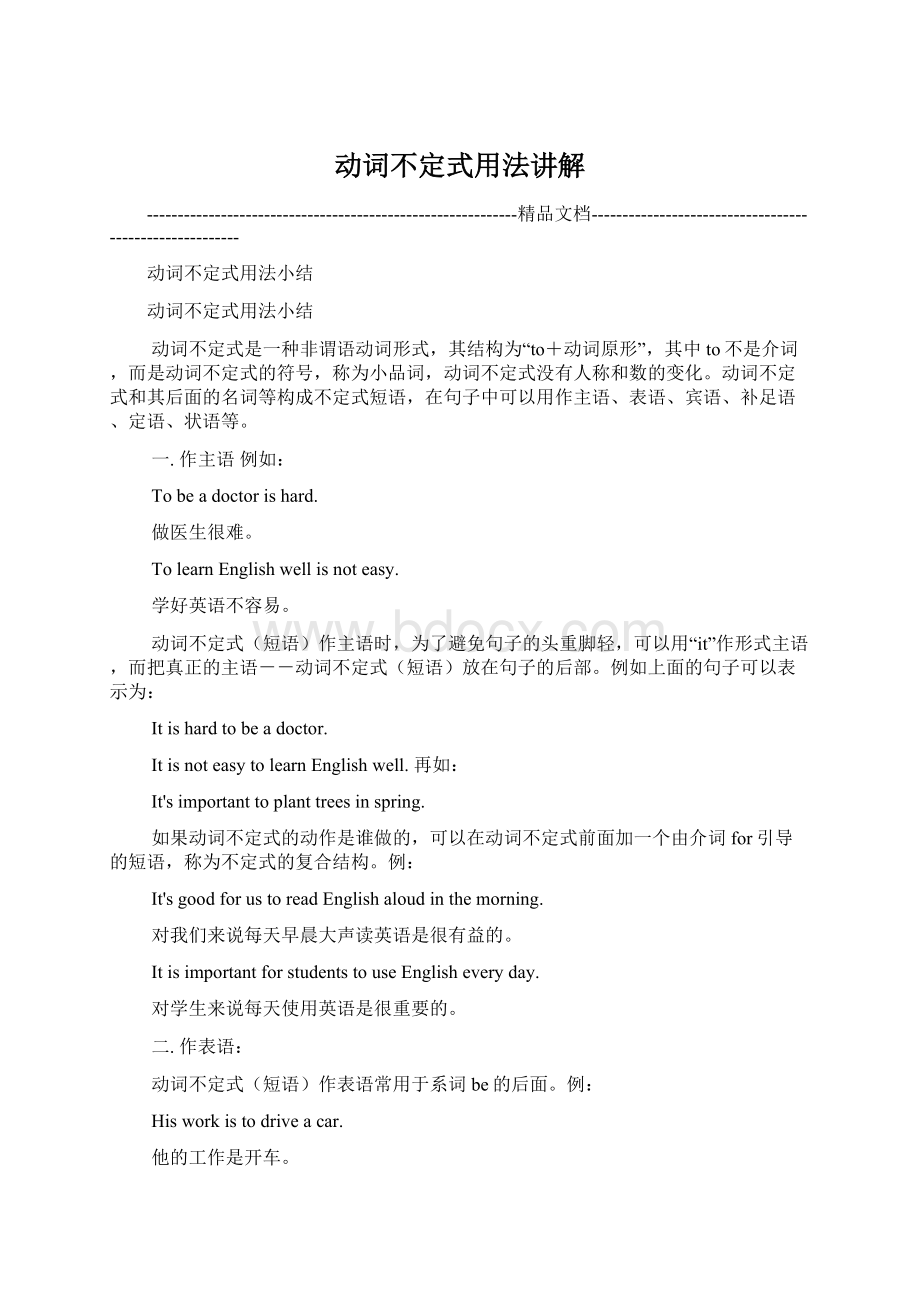动词不定式用法讲解.docx
《动词不定式用法讲解.docx》由会员分享,可在线阅读,更多相关《动词不定式用法讲解.docx(12页珍藏版)》请在冰豆网上搜索。

动词不定式用法讲解
------------------------------------------------------------精品文档--------------------------------------------------------
动词不定式用法小结
动词不定式用法小结
动词不定式是一种非谓语动词形式,其结构为“to+动词原形”,其中to不是介词,而是动词不定式的符号,称为小品词,动词不定式没有人称和数的变化。
动词不定式和其后面的名词等构成不定式短语,在句子中可以用作主语、表语、宾语、补足语、定语、状语等。
一.作主语例如:
Tobeadoctorishard.
做医生很难。
TolearnEnglishwellisnoteasy.
学好英语不容易。
动词不定式(短语)作主语时,为了避免句子的头重脚轻,可以用“it”作形式主语,而把真正的主语--动词不定式(短语)放在句子的后部。
例如上面的句子可以表示为:
Itishardtobeadoctor.
ItisnoteasytolearnEnglishwell.再如:
It'simportanttoplanttreesinspring.
如果动词不定式的动作是谁做的,可以在动词不定式前面加一个由介词for引导的短语,称为不定式的复合结构。
例:
It'sgoodforustoreadEnglishaloudinthemorning.
对我们来说每天早晨大声读英语是很有益的。
ItisimportantforstudentstouseEnglisheveryday.
对学生来说每天使用英语是很重要的。
二.作表语:
动词不定式(短语)作表语常用于系词be的后面。
例:
Hisworkistodriveacar.
他的工作是开车。
Myjobistofeedanimals.
我的工作是饲养动物。
Herambitionistobeadoctor.
她的理想是当医生。
三.作宾语
动词不定式(短语)可以放在一些动词后面用作宾语,能以动词不定式作宾语的动词有:
begin,start,want,forget,remember,show,learn,like,hate,love,ask等。
例:
Iwanttotellyouastory.
我想给你讲个故事。
Theybegintoworkateighteverymorning.
他们每天早晨8点开始工作。
Don'tforgettolockthedoor.
别忘了锁门。
Wouldyouliketogoandhaveapicnicwithustomorrow?
明天和我们一起去野餐好吗?
1
*如果and连接两个动词不定式,第二个动词不定式一般省“to”例:
(1)Hewantstogoandhaveaswimwithus.
他想和我们一起去游泳。
(2)若作宾语的动词不定式(短语)很长,可用it作形式宾语。
IfinditinterestingtolearnEnglishwithyou.
我觉得和你一起学英语很有趣。
Hefoundithardtocatchupwithothers.
他觉得赶上别人很困难。
四.作宾语补足语。
例如:
TheteacheraskedustoreadEnglishforhalfanhourinthemorning.
老师让我们早晨读半小时英语。
TheteacheroftentellsJimnottospendtoomuchtimeplayingcomputergames.
老师常告诉Jim不要花太多时间玩电脑游戏。
Pleaseletmehelpyou.
让我来帮助你。
动词不定式作宾语补足语,表示宾语所做的动作,可以用动词不定式作宾语补足语的动词有:
tell,ask,want,like,invite,encourage,help等。
但在let,make,see,
watch,hear,feel,notice,have等感官听觉动词或使役动词后面作宾语补足语的动词不定式一般要省略动词不定式符号“to”,可以归纳为以下三种句式:
1.不可以省to的不定式作宾语补足语:
tell/ask/want/wouldlike/wish/like/invite/encourage/teachsb.todosth.
例:
Theteachertoldustocomeearliertomorrow.
Iwantyoutogonow.
我想让你现在就走。
Herparentswishhertobeateacher.
她父母亲希望她当老师。
2.省“to”的不定式作宾语补足语:
Let/make/havesb.dosth.
Lettheboygooutnow.
让那个男孩出去。
Theboymadethebabycry.
男孩弄哭了这个小孩。
see/watch/hear/notice/feelsb.dosth.
Isawthestudentsplaybasketballontheplaygroundyesterday.
昨天我看见学生们在操场打篮球。
Ioftenhearthegirlsinginthenextroom.
我经常听到女孩在隔壁唱歌。
3.可省可不省的:
helpsb.(to)dosth.
Ioftenhelpmymother(to)dohousework.
我经常帮妈妈做家务。
*动词不定式的否定式是直接在to之前加not.例:
(1)Tellthemnottoplayfootballinthestreet.
告诉他们不要在街道上踢足球。
2
(2)省to的动词不定式的否定式是直接在动词前面加not.例:
Lettheboynotgo.
让那个男孩别走。
(3)如果将主动语态变为被动语态时,作宾语补足语的动词不定式变为主语补足语,动词不定式则不省“to”,即原来省的再加上,例:
Theboymadethebabycry.
Thebabywasmadetocrybytheboy.
那个孩子被男孩弄哭了。
五.动词不定式作定语
动词不定式作定语常用来修饰名词或不定代词,放于所修饰的词后,为后置定语。
例:
Whowasthefirstonetoarrive?
谁第一个到的?
Shehasnopapertowriteon?
她没有纸写字?
ThebestwaytolearnEnglishistouseit.
学英语最好的方法是使用它。
Whenisthebesttimetoplantvegetables?
什么时候是种植蔬菜的最好时间?
Doyouhavesomethingtodrink?
你这有喝的吗?
*动词不定式(短语)作定语修饰名词时,与其所修饰的词具有一种动宾关系,如果不定式中的动词为不及物动词时,其后应加上一个含义上所需要的介词。
例:
Ihavenochairtositon.
我没有椅子坐。
Hehasnohousetolivein.
他没有房子住。
六.动词不定式作目的状语:
动词不定式作目的状语常用在go,come,hurry等不及物动词后,表目的。
Hewenttoseehissisteryesterday.
他昨天去看妹妹了。
Theygotupearlytocatchtheearlybus.
他们早起去赶早班车。
有时可以把不定式(短语)提前,放于句首,表示强调目的。
例:
ToearlyEnglishquicklyandwell,hewenttoEngland.
为了更快更好地学英语,他去了英国。
七.不定式和疑问词连用,可以作句子的主语、宾语、表语等。
例:
Theproblemiswheretogetacomputer.(表语)
Nooneknowshowtodoit.
没有人知道如何做这件事。
(宾)
Ireallydon'tknowwhichonetochoose.(宾)
我真的不知道选哪一个。
3
Whenandwheretohavethepartyisnotknown.(主语)
何时何地举行联欢还不知道。
*不定式和疑问词连用作宾语时有时可以改为宾语从句。
例:
Idon'tknowwhattodonext.
我不知下一步该做什么?
Idon'tknowwhatIshoulddonext.
附:
动词不定式用法详解
动词不定式是一种活跃的非谓语动词。
它在句中起的是名词。
形容词或副词的作用,可在句子中作主语。
宾语。
定语。
状语和宾语补足语。
动词不定式的形式是o+动词原形,但to有时要省去。
动词不定式在具体运用时,用不用to,取决于谓语动词的用法:
一、带to的不定式结构
1.我们学过的能直接跟带to的不定式结构的动词主要有:
want,ask,tell,hope,
learn,try,decide,forget,remember,like,love,stop,go,come等。
2.动词不定式的否定形式是在不定式前直接加not,即nottodosth.。
例如:
JimtoldmenottowakeupKate.吉姆告诉我别叫醒凯特。
二、不带to的不定式结构
以下几种情况使用不带to的动词不定式:
1.在固定词组hadbetter之后。
注意:
hadbetter的否定形式是hadbetternotdo
sth.。
例如:
Youhadbettergohomenow.你最好现在回家。
It'scoldoutside.You'dbetternotgoout.外面很冷,你最好不要出去。
2.在let,make,see,feel,watch,hear等感官或使役动词后,要跟不带to的动词不定式作宾语补足语。
例如:
Imadethemgivemethemoneyback.我迫使他们把钱还给我。
Ididn'tseeyoucomein.我没看见你进来。
3.在引导疑问句的whynot之后。
Whynot+不带to的不定式是Whydon'tyoudo…的省略,可以用来提出建议或劝告。
例如:
Whynotgowithus。
为什么不和我们一起去呢。
Whynottakeaholiday。
=Whydon'tyoutakeaholiday。
为什么不休个假呢。
三、动词不定式作主语
不定式结构作主语时,现代英语倾向于采用it作形式主语,而把不定式结构后置的形式。
例如:
It'sdifficulttolearnEnglishwell.学好英语很难。
四、动词不定式作定语
不定式作定语,要放在它所修饰的名词或代词的后面。
例如:
Ihavenothingtosayonthisquestion.对这个问题我无可奉告。
4
五、动词不定式作宾语
有的及物动词要求跟复合宾语(即宾语+宾语补足语)。
如果其中的宾语是不定式短语,则必须将形式宾语it放在宾语的位置上,而将不定式短语(真正的宾语)放在宾语补足语之前。
例如:
IfinditusefultolearnEnglishwell.我发现学好英语很有用。
Wethoughtitwrongnottotellher.我们认为不告诉她是错误的。
六、动词不定式作宾语补足语
动词不定式作宾语补足语是动词不定式用法的一个重点,学习时要注意以下三种情况:
1.作动词ask,like,tell等的宾语补足语时,动词不定式符号to不可以省略。
例如:
HeaskedmetotalkaboutEnglishstudy.他请我谈谈英语学习。
2.作使役动词let,have,make以及感官动词feel,hear,see,
watch等的宾语补足语时,动词不定式符号to要省略。
例如:
Theteachermadehimsaythewordlikethis.老师让他像这样说这个单词。
3.作动词help的宾语补足语时,动词不定式符号to可以带,也可以不带。
例如:
Couldyouhelpme(to)carrytheheavybox。
你能帮我搬这个重箱子吗。
七、动词不定式作状语
动词不定式及其短语具有副词的特性,可在句中用作状语。
1.放在句首也可以放在句尾表示目的等。
例如:
Hestoppedtohavearest.他停下来休息。
2.跟在作表语的形容词或过去分词的后面。
例如:
I'msorrytohearthat.听到这事我感到很难过。
3.用在too...to...结构中。
例如:
Heistooyoungtounderstandallthat.他太年轻了,不能理解这件事。
【模拟试题】:
一.选择填空:
1.Heaskedme________hereearlier.
A.comeB.tocomeC.comingD.came
2.Pleasetellhim_______onthewall.
A.don'tdrawB.tonotdrawC.nottodrawD.notdraw
3.Hewanted________acupoftea.
A.tohaveB.havingC.haveD.had
4.I'dlike________awordwithyou.
A.hadB.havingC.tohaveD.have
5.Icamehere_______myuncle.
A.sawB.toseeC.seeingD.tobeseen
5
6.Themanrefused(拒绝)________backhiswords.
A.totakeB.takingC.tookD.takes
7.Icanletyou________oneticket.
A.tohaveB.haveC.havingD.had
8.Weoftenheardhim_________inhisroom.
A.tosingB.singsC.sangD.sing
9.Hewasmade________dayandnight.
A.workB.workingC.toworkD.worked
10.Hestopped______alook,butsawnothing.
A.havingB.tohaveC.haveD.had
11.Myfatherwastooangry_________aword.
A.tosayB.nottosayC.tosayingD.didn'tsay
12.Mybrotherwasoldenough________toschool.
A.wentB.goesC.goingD.togo
13.Itistime________him________supper.
A.of,tohaveB.for,tohaveC.of,havingD.for,tohas
14.It'sverykind_______you______me.
A.of,tohelpB.for,tohelpC.of,helpD.of,helping
15.It'simportant_________ourclassroomcleaneveryday.
A.keptB.tokeepC.togiveD.keep
16.Beforeliberation(解放)theyhadnochance_______toschool.
A.wentB.goC.togoD.tobegone
17.Hesaidhehadanimportantmeeting________.
A.attendB.wouldattendC.attendingD.toattend
18.Pleasegivemeapieceofpaper________.
A.towriteB.towriteonC.writingD.towriteit
19.Idon'tknow_______.
A.whatdoB.whatwilldoC.whattodoD.dowhat
20.Yourradioneeds________.
A.toberepairedB.torepairC.repairedD.torepairing
21.Mywishis________ateacher.
A.becomingB.tobecomeC.becomeD.became
22.Iwant________himaletternow.
A.towriteB.notwriteC.writeD.wrote
23.Ittookusthreedays_________thetrees.
A.plantB.plantedC.toplantD.plants
24.Whynot________here_______me?
A.tocome,toseeB.come,toseeC.came,seeingD.come,see
6
25.Hewishesme______mybest_________hardatEnglish.
A.todo,toworkB.doing,workingC.todo,workingD.do,work
26.Pleasetellme________her.Ihavesomething_______her.
A.wheretofind,tellingB.wheretofind,totell
C.wherecanfind,totellD.wherefinding,telling
27.Howhappytheyare______eachotheragain!
A.toseeB.seeC.sawD.beingseen
28.Theydecided(决心)_______aletter______theirthanks.
A.towrite,expressing(表达)B.writing,express
C.write,expressedD.towrite,toexpress
29.Theofficerordered(命令)him_______down_________arest.
A.lying,haveB.tolie,tohaveC.tolie,havingD.lie,had
30.Theheadmastercalledon(号召)us______hardforourcountry.
A.toworkB.workedC.workD.toworking
二.根据上句意思完成下句,使两句意思相近或相同,每空一词。
1.Hewassoangrythathecouldn'tsayanything.
Hewastooangry_____________anything.
2.Idon'tknowwhenwewillhavethemeeting.
Idon'tknowwhen______________themeeting.
3.Hesaidhewouldwritealetter.
Hesaidhewouldhavealetter_____________.
4.ThatyoureadEnglishinthemorningisveryimportant.
Itisveryimportant_____you____________Englishinthe
morning.
5.Hewassostrongthathecouldliftthestone.(石头)
Hewasstrong________________thestone.
7
6.HisfatherwenttoBeijingforhisholiday.
HisfatherwenttoBeijing______________hisholiday.
7.Theygot